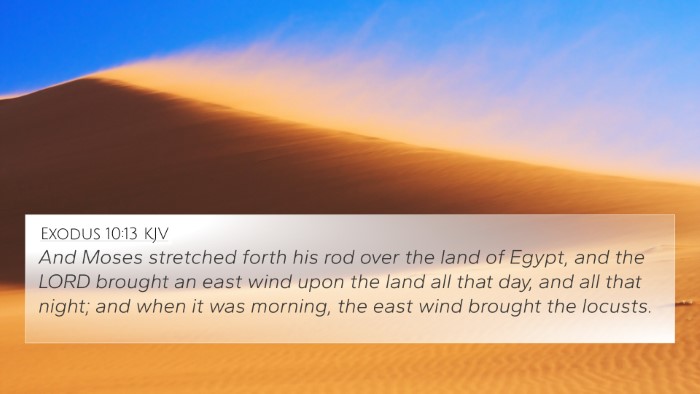Understanding Proverbs 30:27
Verse: Proverbs 30:27
"The locusts have no king, yet they go forth all of them by bands."
Summary of Insights
The verse speaks to the remarkable nature of locusts, which, despite lacking a singular ruler, cooperate in large groups. This observation can reflect various spiritual truths regarding leadership, unity, and the power of collective action.
Commentary Insights
- Matthew Henry: Emphasizes the unity of purpose among locusts despite their lack of centralized authority. This can serve as a metaphor for human endeavors where unity is essential, even without a visible leader.
- Albert Barnes: Notes that the behavior of locusts demonstrates that they can achieve great feats when operating in a coordinated manner. This alludes to the significance of community and shared objectives in achieving common goals, reinforcing the idea that collaboration can be as powerful as leadership.
- Adam Clarke: Connects the verse to observations in nature, pointing to the intelligence of God’s creation. He highlights that the lack of a king does not hinder the locusts from functioning effectively as a group, suggesting that divinely ordained structures can still yield order and results.
Thematic Connections
This verse leads us to consider various themes across the Bible regarding leadership, unity, and divine order. Here are some connections:
- Ecclesiastes 4:9-12: Acknowledges the strength found in unity.
- Acts 2:44-47: Describes the early church's communal living.
- 1 Corinthians 12:12-27: Discusses the body of Christ and the unity within diversity.
- Philippians 1:27: Urges believers to strive together for the faith of the gospel.
- Hebrews 10:24-25: Encourages believers to spur one another toward love and good deeds.
- Matthew 18:20: Illustrates that wherever two or three gather in His name, there He is among them.
- Psalm 133:1: Speaks to the goodness of brethren dwelling in unity.
Cross-Referencing Insights
To embark on a comprehensive understanding of Proverbs 30:27, the following interrelated verses can be examined:
- Proverbs 6:6: "Go to the ant, thou sluggard; consider her ways, and be wise." - Encouraging observation of nature for wisdom.
- Matthew 10:16: "Behold, I send you forth as sheep in the midst of wolves: be ye therefore wise as serpents, and harmless as doves." - A call for wisdom and cooperation amidst adversity.
- 1 Corinthians 3:6: "I have planted, Apollos watered; but God gave the increase." - Highlighting collective efforts in ministry.
- Romans 12:4-5: "For as we have many members in one body, and all members have not the same office: So we, being many, are one body in Christ." - Emphasizing unity in diversity.
Bible Verse Cross-References and Their Significance
Understanding the locusts and their collective behavior opens a dialogue for studying the importance of inter-Biblical references:
- Tools for Bible Cross-Referencing: Utilizing a Bible concordance can assist in identifying key thematic connections.
- Bible Cross-Reference Guide: Following canonical order can help trace themes from Old to New Testament.
- Cross-Reference Bible Study: Engaging in group studies that facilitate discussions on these connections.
Cross-Referencing Biblical Texts
Cross-referencing helps to view the interconnectedness in the scripture, revealing that:
- Comparative Bible Verse Analysis: Insightful when examining key themes of leadership and cooperation.
- Identifying Connections between Old and New Testament: It enriches the study experience.
- Cross-Referencing Bible Study Methods: Conducting thematic studies can bolster our understanding of faith and actions within community settings.
Conclusion
The wisdom encapsulated in Proverbs 30:27 encourages believers to reflect on the power of community and collective action. By understanding the nature of the locusts and drawing parallels to scriptural teachings, we recognize the strength found in unity and cooperation, even in the absence of a singular leader.
Remember: Engaging with cross-references not only deepens our understanding but also connects us to the broader narrative of Scripture.










